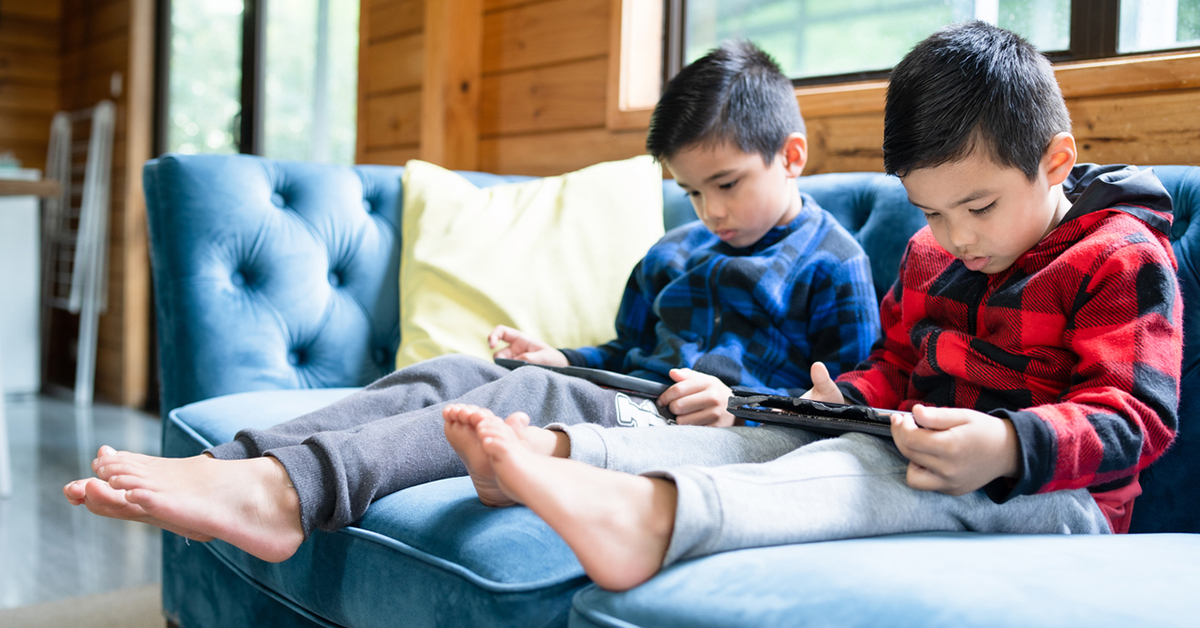
As summer approaches, families often look for ways to make the most of the sunny days and warm weather. With the allure of screens, it’s easy for kids to spend hours glued to their devices, and as parents, it’s understandable that we appreciate the break from this. However, minimizing screen time can lead to healthier habits for our kids and us, and help us all have more enriching experiences.
We spoke with screen time expert Emily Cherkin, M.Ed. Cherkin is a public speaker, consultant, associate professor of public policy, and author of The Screentime Solution: A Judgment-Free Guide to Becoming. You can learn more about her practice here at The Screen Time Consultant.
Cherkin has some key screen time points she shares:
- Less is more
- Later is better
- Relationships and skills before screens
With those points in mind, here are some effective strategies to encourage kids to unplug and enjoy a screen-free summer.
Set Clear Boundaries
Establish specific limits on screen time. For example, you might decide that screens are only allowed on rainy days or during certain hours. Cherkin explains that screens are unavoidable, but to make the most of them when you do decide to use them, use them intentionally. Communicate these rules clearly and involve your kids in the decision-making process to foster understanding and cooperation.
Encourage Outdoor Activities
In Oregon, our summers are pretty magical, so get outside. Promote outdoor play by organizing activities that get kids moving. We have a recent post by Cherise Arthur that shows some cheap ways to adventure in Oregon. This can help get you started.
But also consider the following:
- Nature Walks- Explore local parks or nature trails.
- Sports- Join a local sports league or simply play catch in the backyard.
- Gardening- Involve kids in planting flowers or vegetables, teaching them about nature while keeping them active.
Plan Engaging Crafts and Projects
Summer is a great time for creativity. Provide materials for arts and crafts, DIY projects, or science experiments. Go to SCRAP for supplies and head on over to The Lobby to help get their creative juices flowing. Cherkin suggests listening to music, podcasts, or audiobooks for other ways to engage your kids.
Kids can create something like this:
- Art Installations- Use recycled materials to make sculptures.
- Homemade Bird Feeders- Attract local wildlife while learning about nature.
- Kid Podcast, Radio Station, or Talk Show- Get your kids writing scripts, stories, and more, and trying their interview or DJ skills.
Organize Playdates
Arrange playdates with friends or neighbors. Or better yet, channel a 1980s/1990s childhood and have your kids make their own hangs. Social interactions not only reduce screen time but also enhance social skills.
Consider planning group activities like:
- Outdoor Games- Capture the flag, hide and seek, or relay races.
- Water Fun– Get out the slip and slide, or sprinkler, or get a kiddie pool!
- Picnics- Enjoy meals outdoors with friends.
Introduce Reading Challenges
Encourage reading by setting up a summer reading challenge. Create a list of books and reward kids for completing them. Visiting the library can also be a fun outing, providing a chance to discover new stories and authors. Check out how to get involved in your local library and how to get a library card for your kids.
Lead by Example
Oof, this is a hard one! Kids often mimic adult behaviors. Show your commitment to reducing screen time by limiting your own device usage. Modeling behavior is a great way to show your kids what is really important to you. Engage in activities together, such as cooking, hiking, or playing board games, to model a balanced lifestyle.
Incorporate Technology Wisely
Not all screen time is detrimental. Use technology to your advantage by selecting educational apps or programs that promote learning. Set aside specific times for these activities, ensuring they remain balanced with physical play and creativity. And Cherkin suggests that a movie or a longer form of content is better for our brains than short-form media, which is the kind we all love. This is a great time to introduce your kids to your favorite kid-friendly movies.
Create a Daily Routine
Establishing a daily routine can help manage expectations. Include time slots for outdoor play, reading, chores, and family activities. A structured schedule can minimize the temptation to resort to screens out of boredom.
As Cherkin stresses, the most important thing is focusing on relationships and skills. What a wonderful opportunity to focus on that as a family. At the end of the summer, reflect on what worked and what didn’t. Discuss with your kids what they enjoyed and how they felt about their screen time. This feedback can help shape future activities and routines.
Minimizing screen time during the summer can lead to a more active, engaged, and creative lifestyle for kids. By setting boundaries, encouraging outdoor play, and finding alternative activities, families can create meaningful experiences without relying so heavily on those screens. This is a great experiment for you and your kids.

Johanna is married with two kids, three dogs, three cats, one leopard gecko, several chickens, and a few fish. She has been in the Pacific Northwest since the dream was alive in the 90s but has Southern roots and hails from Arkansas. The family spends a lot of time at some sort of sporting event for the kids. Johanna likes to fast craft, garden, host parties, and bake. Johanna and her crew go hard traveling, DIY-ing, and are always up for a new adventure or challenge.
